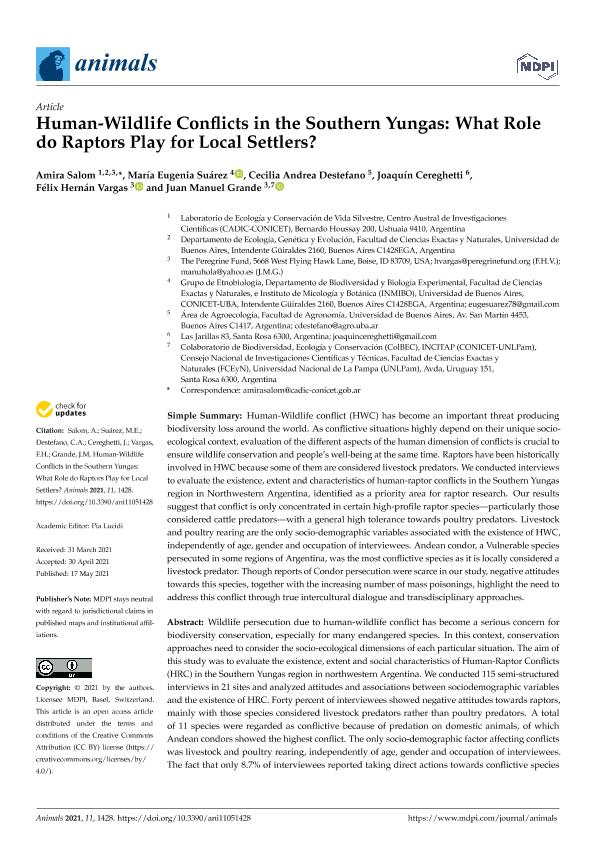Artículo
Human-wildlife conflicts in the southern yungas: What role do raptors play for local settlers?
Salom, Amira ; Suárez, María Eugenia; Destefano, Cecilia Andrea; Cereghetti, Joaquín; Vargas, Félix Hernán; Grande, Juan Manuel
; Suárez, María Eugenia; Destefano, Cecilia Andrea; Cereghetti, Joaquín; Vargas, Félix Hernán; Grande, Juan Manuel
 ; Suárez, María Eugenia; Destefano, Cecilia Andrea; Cereghetti, Joaquín; Vargas, Félix Hernán; Grande, Juan Manuel
; Suárez, María Eugenia; Destefano, Cecilia Andrea; Cereghetti, Joaquín; Vargas, Félix Hernán; Grande, Juan Manuel
Fecha de publicación:
05/2021
Editorial:
Multidisciplinary Digital Publishing Institute
Revista:
Animals
ISSN:
2076-2615
Idioma:
Inglés
Tipo de recurso:
Artículo publicado
Clasificación temática:
Resumen
Wildlife persecution due to human-wildlife conflict has become a serious concern for biodiversity conservation, especially for many endangered species. In this context, conservation approaches need to consider the socio-ecological dimensions of each particular situation. The aim of this study was to evaluate the existence, extent and social characteristics of Human-Raptor Conflicts (HRC) in the Southern Yungas region in northwestern Argentina. We conducted 115 semi-structured interviews in 21 sites and analyzed attitudes and associations between sociodemographic variables and the existence of HRC. Forty percent of interviewees showed negative attitudes towards raptors, mainly with those species considered livestock predators rather than poultry predators. A total of 11 species were regarded as conflictive because of predation on domestic animals, of which Andean condors showed the highest conflict. The only socio-demographic factor affecting conflicts was livestock and poultry rearing, independently of age, gender and occupation of interviewees. The fact that only 8.7% of interviewees reported taking direct actions towards conflictive species indicates a relatively peaceful coexistence of people with raptors. Nevertheless, negative attitudes towards Andean condor together with their extreme susceptibility to any increase in non-natural mortality indicate the need of an integral conservation approach to tackle future threats for this species’ conservation in the area.
Archivos asociados
Licencia
Identificadores
Colecciones
Articulos(CADIC)
Articulos de CENTRO AUSTRAL DE INVESTIGACIONES CIENTIFICAS
Articulos de CENTRO AUSTRAL DE INVESTIGACIONES CIENTIFICAS
Articulos(INCITAP)
Articulos de INST.D/CS D/L/TIERRA Y AMBIENTALES D/L/PAMPA
Articulos de INST.D/CS D/L/TIERRA Y AMBIENTALES D/L/PAMPA
Articulos(INMIBO (EX - PROPLAME))
Articulos de INSTITUTO DE MICOLOGIA Y BOTANICA
Articulos de INSTITUTO DE MICOLOGIA Y BOTANICA
Citación
Salom, Amira; Suárez, María Eugenia; Destefano, Cecilia Andrea; Cereghetti, Joaquín; Vargas, Félix Hernán; et al.; Human-wildlife conflicts in the southern yungas: What role do raptors play for local settlers?; Multidisciplinary Digital Publishing Institute; Animals; 11; 5; 5-2021; 1-18
Compartir
Altmétricas



